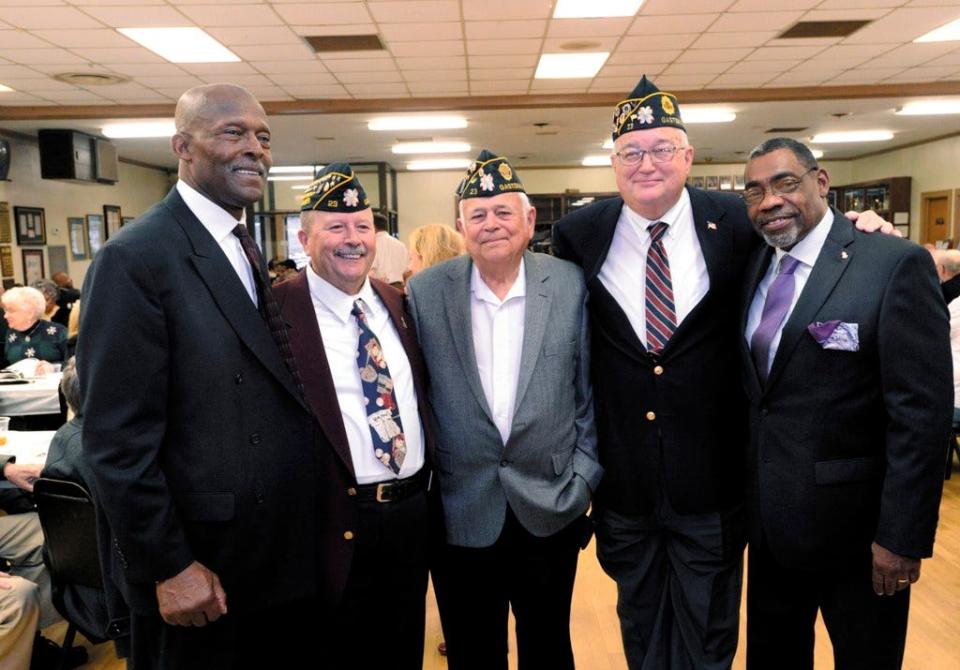Gaston Sports Hall of Fame: Here's how baseball led Willie Gillespie to a greater purpose
When Willie Gillispie grew up in Gaston County in the 1950s and 1960s, he developed a love affair with baseball. The sport helped create opportunities folks of Gillispie's era could not have imagined in his childhood.
Now, it has led to induction in two halls of fame.
A 2015 inductee into the North Carolina American Legion Hall of Fame, Gillispie will be a part of the 2024 Gaston County Sports Hall of Fame induction class on April 8 at the Gastonia Conference Center.
SMALL TOWN, BIG TALENT: Gaston Sports Hall of Fame: Football talent launches Sean Boyd to career at UNC, NFL
COMMUNITY HEIRLOOM: Gaston Sports Hall of Fame: Here's why Trace Barnette is considered a 'community heirloom'
"It's going to be a great honor for me," Gillispie said. "I will say this: There's a lot of people that deserve to be in the Gaston County Sports Hall of Fame. What I accomplished in Gaston County is very important to me because I love Gaston County — and I had a lot of help."
Gillispie was a racial pioneer for teams and a former Gaston County high school in the 1960s where his success helped ease many of the tensions that existed during his athletic career. Gillispie and another African-American classmate from Gastonia's old Highland High School, Elmore Hill, were asked to do something they were unaware of at the time when they were invited to play for Gastonia American Legion Post 23's baseball team in 1964.
Gillispie overcame racial slurs, perceived slights and a climate where many were unhappy with him and Hill being on the field as the first African-American baseball players in the state of North Carolina.
"My good fortune was having a big brother on that team in Elmore Hill," Gillispie said. "He was always calm no matter what happened and I was a hot head. I had him to kind of calm me down when things were tough.
“I remember when we were playing a game at the old Fairgrounds in Hickory. This bunch of kids sitting on the brick wall were throwing pebbles at me and hitting me on the back of the legs. I think he was playing center and I was in right or left field.
"I said, 'Moe, what are we going to do?' He said, 'Jet, just play ball!' It was hard and it was different, but I had a lot of support from my teammates and then I had my big brother Moe to keep me calmed down."
Early in the 1964 season, Gillispie was on first base and given a steal sign just before a batter singled to right field. Since Gillispie was schooled in aggressive baseball, he figured he would be at third base in moments when Post 23 assistant coach and third base coach Don Saine held him up.
"When I got past second, coach Saine held me up," Gillispie said. "So, when I tried to get back, I got tagged out. And when I got to the bench, he chewed me out. I said, 'Coach, no disrespect, but if you're stealing me and there's a base hit to right field, don't hold me up because I'm going to be on third base.'
"After that, they never held me up."
Saine, a 2007 GCSHOF inductee, became so fond of Gillispie that within a year, he coached the speedy running back on his football team at old Dallas High, where Gillispie and two other African-American players broke the color line at that school in the fall of 1965.

Amazingly, Gillispie was only 15 years old when he played for Post 23 in the summer of 1964. And while Jackie Robinson had broken the color line in major league baseball 17 years earlier, the Civil Rights Act that prompted change in states like North Carolina was not ratified until five weeks into their historic season. Even as the Supreme Court's precedent-setting Brown vs. Board of Education ruling was 10 years earlier, Gaston County was two years away from fully integrating its schools.
Gillispie attended three high schools: Bessemer City's Lincoln High, Gastonia's Highland High, and Dallas High where he graduated in 1966. He also continued to shine for Post 23 as the team won the Area IV title all three years. He led Gastonia in 1966 with a .419 batting average.
After one year playing football and baseball at Shaw University in Raleigh, Gillispie returned to Gastonia, enlisted in the military as a medic and played one season for Gaston College's inaugural baseball team for Hugh "Buzz" Peeler. Peeler, a Cherryville American Legion Post 100 star in 1953, who later played at Lenoir-Rhyne and professionally, was the coach of the 1964 Post 23 team.
Gillispie, a graduate of Gaston College's nursing school, has lived in Salisbury for decades and retired in 2012 from the city's Veterans Administration Hospital.
This article originally appeared on The Gaston Gazette: Gaston County Sports Hall of Fame: Willie Gillespie

